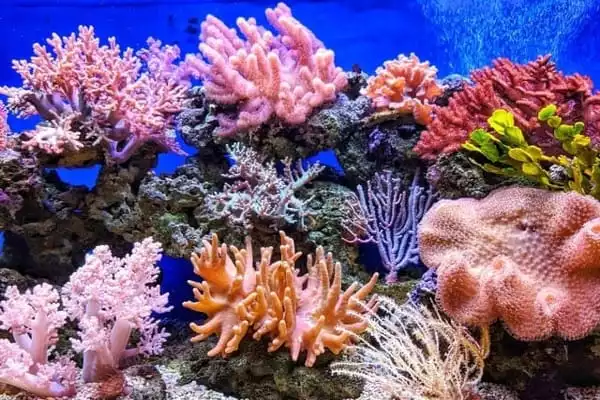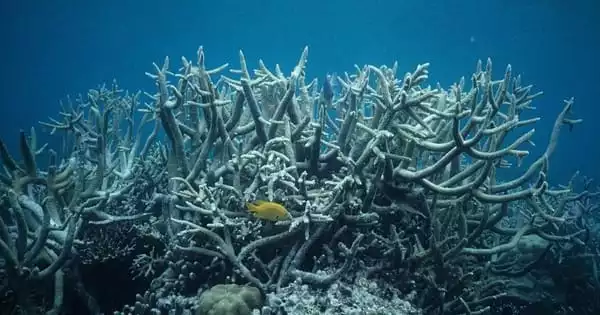When corals are disturbed by changes in factors such as temperature, light, or nutrition, they eject the symbiotic algae dwelling in their tissues, causing them to turn entirely white. Warming waters threaten to change coral reefs from kaleidoscopes of color to bleached landscapes of rubble. To halt this deterioration, several scientists are looking at a surprise remedy: probiotics.
Researchers report in Science Advances on that dosing corals with a mix of helpful bacteria prevented death in a heat wave simulation in an aquarium. In comparison, over half of the corals given a safe saline solution did not survive the same conditions. The study provides proof of concept that probiotics could help some corals tolerate heat stress.
“The findings are quite encouraging,” says Blake Ushijima, a microbiologist at the University of North Carolina Wilmington who was not involved in the study. “We’re just scratching the surface,” he adds of his research into employing probiotics as coral medication. We don’t know how many of these beneficial microorganisms work.”
Corals are coalitions of cooperating players, not single entities. The photosynthetic algae take center stage, harnessing the power of the sun to provide energy to their animal host, the coral polyp. Numerous bacteria live in the coral as well, many of which help their host by cycling nutrients or combating diseases. Collectively referred to as the coral “holobiont,” corals and their microbial partners form the bedrock of one of the most biodiverse ecosystems on the planet.
Climate change is affecting corals faster than they can adapt, but their microbial partners can respond to changes more quickly. Such changes, which probiotic treatments could induce, might buy corals more time.
Kimberly Ritchie
Worsening maritime heat waves are putting the health of healthy holobionts to the test. Coral algae emit harmful compounds in response to heat stress, leading polyps to force them out. This process, known as bleaching, has the potential to harm corals. Bleaching from a 2016 heat wave, for example, wiped away 29 percent of shallow water corals in the northern Great Barrier Reef. Under heat stress, bacterial communities alter as well, compromising the benefits that particular bacteria bring.
“Overall, we see a breakdown of symbiotic relationships, and all the microorganisms start to struggle,” says Raquel Peixoto, a marine ecologist at King Abdullah University of Science and Technology in Thuwal, Saudi Arabia. She and her colleagues previously showed that treating corals with carefully concocted probiotic cocktails could mitigate coral bleaching in lab experiments. That’s good, she says, “but we wanted to find out if we can protect them against mortality.”

The researchers most recently recreated a marine heat wave across 10 aquaria, each with four fragments of Mussismilia hispida stony corals, raising the temperature to 30° Celsius for 10 days before lowering it to 26° Celsius. Half of the corals were sprayed with six M. hispida bacterial strains every three days during the heat wave and every five days afterward, while the other half received a saline treatment. Peixoto and her colleagues examined coral health and changes in the holobiont’s metabolic activity over the period of 75 days, as well as which genes were turned on and off.
Both groups of corals bleached, but the probiotic treatment eventually worked. While 40 percent of saline-treated corals died in the heat, all bacteria-bathed corals survived. “That was unexpected and extremely exhilarating,” Peixoto says. The probiotic appears to promote coral recovery by activating genetic and metabolic changes in the host that are related with reducing inflammation and allowing damaged cells to rebuild themselves, according to the researchers.
“Climate change is affecting corals faster than they can adapt,” but their microbial partners can respond to changes more quickly, says Kimberly Ritchie, a marine biologist at University of South Carolina Beaufort who wasn’t involved in the research. Such changes, which probiotic treatments could induce, might “buy corals more time,” she says.
Peixoto and her colleagues intend to go outside the tank, beginning trials in mid-August to explore if probiotics may benefit wild corals. However, other experts are doubtful of the added bacteria’s long-term utility, particularly for huge reefs with hundreds of coral species. “Probiotics are really fashionable right now,” says Ty Roach, a molecular ecologist at the Hawaii Institute of Marine Biology in Kaneohe. “I can think of situations when this would be a wonderful strategy… But I don’t think they’ll save the reefs.”
Applying probiotics to huge reefs with hundreds of coral species, for example, appears logistically difficult, according to Roach. There may also be unforeseen repercussions. “What works for one coral may not work for another coral or organism,” explains Roach. “I can’t envisage doing this on a broad scale for ecosystems as complicated as coral reefs without some unintended, maybe detrimental repercussions.”
According to Peixoto, the probiotics utilized here have been thoroughly vetted, and no strains known to be detrimental to life are used. Probiotics, in general, “aren’t going to be a silver bullet,” she says. The only way to conserve the reefs is to cut carbon dioxide emissions and thereby global warming. “But we still need restoration and rehabilitation to cope with the reality that we have now,” she says, and probiotics show promise.
















